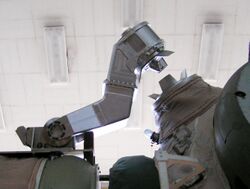Lyappa arm
Topic: Astronomy
 From HandWiki - Reading time: 5 min
From HandWiki - Reading time: 5 min


The Lyappa (or Ljappa) arm, officially Automatic system of re-docking (Russian: Автоматическая система перестыковки (АСПр), romanized: Avtomaticheskaya sistema perestykovki (ASPr)), was a robotic arm used during the assembly of the Soviet/Russian space station Mir. Each of the Kvant-2, Kristall, Spektr and Priroda modules was equipped with one of these arms, which, after the module had docked to the Mir Core Module's forward (or axial) port, grappled one of two fixtures positioned on the core module's hub module. The module's main docking probe was then retracted, and the arm raised the module so that it could be pivoted 90 degrees for docking to one of the four radial docking ports.[1][2][3]
Likewise the Prichal module will host the grapple fixtures for the redocking of future modules docked to it from one port to another using the Lyappa Arm attached to those modules, if needed.
Both the Wentian and Mengtian modules of the Tiangong space station carry arms to enable them to manoeuvre around the docking hub of the Tianhe core module. A mechanical arm dubbed the Indexing robotic arm, which looks similar to the Lyappa arm, allowed them to dock to a radial port of the CCM.[4] It is different from Lyappa as it works on a different mechanism. Lyappa arm is needed to control the pitch of the spacecraft and redocking in a different plane. Where as the Indexing robot arm is needed for docking in the same plane. In addition to this arm used for docking relocation, the Chinarm on Tianhe module could also be used as a backup.[5][6]
Naming
The word “Lyappa” does not exist in Russian. It is probably a corruption of Russian: лапа, romanized: lapa, lit. 'paw'.
A fundamentally new element in this operation is the re-docking manipulator. Sometimes we just called it “paw”, which was clearer. This electromechanical arm, short and powerful, really resembled the paw of a Siberian bear, hence its name.
— Vladimir Syromyatnikov[7]
Gallery
-
Lyappa arm and attach fixture on Mir
-
Lyappa arm at the RKK Energiya museum
-
A diagram showing how the arm was used to relocate Kvant-2.
-
A diagram showing the Konus drogue and module movements around Mir's docking node
References
- ↑ David Harland (30 November 2004). The Story of Space Station Mir. New York: Springer-Verlag New York Inc. ISBN 978-0-387-23011-5. https://books.google.com/books?id=sBdUh8WqEfYC&q=the+story+of+space+station+mir.
- ↑ David S. F. Portree (March 1995). Mir Hardware Heritage. NASA. http://en.wikisource.org/wiki/Mir_Hardware_Heritage.
- ↑ "Archived copy". Archived from the original on 2011-10-15. https://web.archive.org/web/20111015135436/http://see.msfc.nasa.gov/sts79.pdf. Retrieved 2012-02-11.
- ↑ Graham, William; Gebhardt, Chris (April 28, 2021). "China readies launch of Tianhe module, start of ambitious two-year station construction effort". NASASpaceflight.com. https://www.nasaspaceflight.com/2021/04/china-station-construction-begins/. "This means the two future science modules, Wentian (“Quest for the heavens”) and Mengtian (“Dreaming of the heavens”), cannot dock directly to their planned radial port locations. [...] To account for this, each module will carry a Russian Lyappa robotic arm — like the ones used on Mir for the same purpose — to move the module from the forward port to its respective permanent location on a radial port of Tianhe's docking hub."
- ↑ Hong Yang (2020). Manned Spacecraft Technologies. China: Springer. pp. 355. ISBN 978-9811548970.
- ↑ Graham, William; Gebhardt, Chris (April 28, 2021). "China readies launch of Tianhe module, start of ambitious two-year station construction effort". NASASpaceflight.com. https://www.nasaspaceflight.com/2021/04/china-station-construction-begins/.
- ↑ Сыромятников 2010, pp. 189–197, Перестыковка: как часовой механизм.
Further reading
- Industrial Robotic Arm Manufacturing
- Сыромятников, Владимир (2010). 100 рассказов о стыковке. Часть 2. М.: Университетская книга Логос. ISBN 978-5-98704-455-1.
 |
 KSF
KSF




